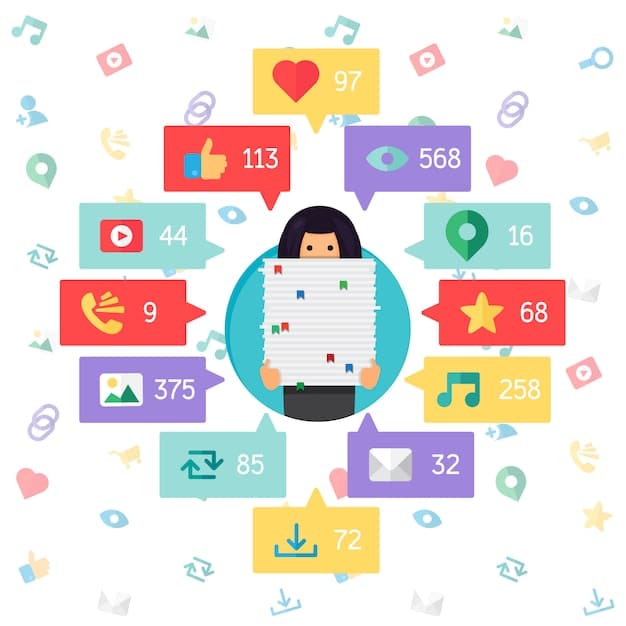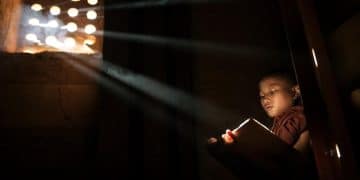Social Media’s Impact on Literary Criticism: A Review Analysis

Examining the influence of social media on contemporary literary criticism through an analysis of 500 book reviews reveals the shift towards more accessible, personalized, and interactive forms of literary discourse, impacting traditional academic standards.
The digital age has revolutionized numerous aspects of society, and literary criticism is no exception. Examining the influence of social media on contemporary literary criticism: a study of 500 book reviews offers a compelling perspective on how these platforms are reshaping the way we engage with and interpret literature.
The Rise of Social Media in Literary Discussions
Social media has become a ubiquitous part of modern life, transforming communication and information sharing. This shift has had a profound effect on various fields, including literary criticism. The accessibility and interactivity of platforms like Twitter, Goodreads, and Instagram have created new avenues for discussing and analyzing literature.
Traditionally, literary criticism was confined to academic journals and scholarly publications. However, social media has democratized the field, allowing anyone with an internet connection to share their thoughts and opinions on books. This accessibility has led to a wider range of voices and perspectives in literary discussions.
The Democratization of Literary Criticism
Social media platforms have leveled the playing field, making literary criticism more accessible to a broader audience. This has empowered readers to engage with literature on their own terms, without the need for formal academic training.
The Shift Towards Informal Reviews
Social media reviews tend to be more informal and personal than traditional academic critiques. These reviews often focus on the reader’s emotional response to the book, rather than in-depth analysis of themes and symbolism.
- Increased engagement with books through online communities.
- Readers sharing personal experiences and interpretations.
- Authors directly interacting with their readers, receiving immediate feedback.
In conclusion, social media has fundamentally altered how literary criticism is disseminated and consumed. The rise of online platforms has empowered readers and writers alike, fostering a more dynamic and participatory literary culture.
Analyzing 500 Book Reviews: Methodology
To understand the specific ways in which social media influences literary criticism, a thorough analysis of 500 book reviews was conducted. This study aimed to identify trends, patterns, and differences in the way books are discussed online compared to traditional forms of literary criticism.
The methodology involved gathering a diverse sample of book reviews from various social media platforms, including Goodreads, Twitter, Instagram, and blogs. These reviews were then analyzed for content, tone, style, and engagement metrics.

Data Collection and Sampling
The selection of book reviews was carefully curated to represent a range of genres, authors, and reader demographics. This ensured that the findings would be representative of the broader landscape of online literary criticism.
Qualitative and Quantitative Analysis
Both qualitative and quantitative methods were employed to analyze the collected data. Qualitative analysis focused on identifying recurring themes, arguments, and writing styles, while quantitative analysis measured engagement metrics such as likes, comments, and shares.
- Categorization of reviews by genre, author popularity, and platform.
- Analysis of the language used, including sentiment and emotional tone.
- Examination of the reviewer’s background and credentials.
In short, the methodology employed a multifaceted approach to capture the nuances of social media’s influence on literary criticism. This rigorous analysis provided a comprehensive understanding of the evolving dynamics of online literary discourse.
The Impact on Traditional Literary Criticism
The rise of social media has presented both challenges and opportunities for traditional literary criticism. While online platforms have democratized access to literary discussions, they have also raised concerns about the quality and rigor of online reviews.
Traditional literary criticism, with its emphasis on scholarly research and critical analysis, may seem at odds with the more informal and subjective nature of social media reviews. However, there is also potential for these two approaches to complement each other.
Balancing Accessibility and Rigor
One of the key challenges is finding a balance between accessibility and rigor. While social media reviews can be valuable for their emotional honesty and personal insights, they may lack the depth and expertise of traditional academic critiques.
The Role of Expertise in the Digital Age
The proliferation of online voices raises questions about the role of expertise in the digital age. How can readers distinguish between informed opinions and uninformed rants? What value do traditional credentials and academic training hold in an online world?

- Adapting traditional methods to engage with wider audiences online.
- Encouraging critical thinking and informed analysis on social media.
- Fostering collaboration between academics and online reviewers.
In conclusion, the impact of social media on traditional literary criticism is multifaceted. While challenges exist, there is also significant potential for innovation and collaboration, leading to a more vibrant and inclusive literary landscape.
Changes in Language and Style
Social media platforms have not only changed who participates in literary criticism, but also how they communicate. The language and style of online reviews tend to be more informal, conversational, and emotionally driven than traditional academic writing.
The constraints of platforms like Twitter, with its character limits, have forced reviewers to be concise and direct. Visual elements, such as emojis and images, have also become integral to online communication.
The Rise of Expressive Language
Social media reviews often prioritize emotional expression over analytical rigor. Readers are more likely to share their immediate reactions to a book, using subjective language and personal anecdotes.
The Influence of Visual Culture
The visual nature of platforms like Instagram has led to a greater emphasis on aesthetics in literary discussions. Book covers, author photos, and visually appealing graphics have become important components of online reviews.
The use of abbreviated language, hashtags, and memes creates a unique digital dialect that reflects the fast-paced and interactive nature of online communication. This contrasts sharply with the formal, academic language of traditional literary criticism.
The Author-Reader Relationship
Social media has transformed the relationship between authors and readers, creating new opportunities for direct interaction and feedback. Authors can now engage with their audience in real-time, responding to reviews, answering questions, and participating in online discussions.
This increased level of engagement can be both beneficial and challenging for authors. While positive feedback can be encouraging and validating, negative reviews can be emotionally taxing and damaging to their reputation.
Direct Engagement and Feedback
Social media has made it easier for authors to receive immediate reactions to their work. This can allow for real-time adjustments and learning experiences.
Managing Online Reputation
Authors now have to actively manage their online presence, which can influence their image and professional standing.
The direct connection between authors and readers can lead to a more collaborative and supportive literary community. However, it also requires authors to navigate the complexities of online communication and reputation management.
Ultimately, social media has reshaped the dynamics between authors and readers, fostering new levels of interaction and accountability. This transformation has profound implications for the future of literary creation and consumption.
Examining the Future of Literary Criticism
As social media continues to evolve, its influence on literary criticism is likely to grow even stronger. The future of literary discourse may involve a hybrid model that combines the accessibility of online platforms with the rigor of traditional academic inquiry.
The digital age presents both opportunities and challenges for those who are passionate about literature. By embracing new technologies and fostering constructive dialogue, we can create a more vibrant and inclusive literary culture.
Embracing Digital Innovation
Literary critics and academics can leverage social media to reach wider audiences and engage in more dynamic conversations. This can democratize access to knowledge and foster a greater appreciation for literature.
Promoting Constructive Online Dialogue
It’s essential to foster online communities that value critical thinking, respectful communication, and informed analysis. This can help counter the spread of misinformation and promote more nuanced understanding of literature.
- Collaborations between academic institutions and online literary communities.
- Development of digital tools and resources for literary analysis.
- Education initiatives that promote media literacy and critical thinking.
Social media’s impact is just beginning. The platforms of tomorrow have yet to be created, and critics will need to adapt as the landscape evolves. In the end, this will expand and revitalize the field of literary criticism.
| Key Aspect | Brief Description |
|---|---|
| 📱 Social Media Rise | Platforms like Twitter & Goodreads democratize literary discussions. |
| ✍️ Review Style | Reviews shift towards informal, personal, and emotionally driven content. |
| 🧑🤝🧑 Author-Reader Connection | Authors engage directly, receiving real-time feedback and managing online reputation. |
| 📚 Traditional Criticism | Faces need to balance accessibility with academic rigor. Collaboration can benefit. |
Frequently Asked Questions
▼
Social media has allowed anyone to share their opinions, regardless of academic background, creating a wider, more diverse range of perspectives on literature. This democratization fosters engagement from new audiences.
▼
Online reviews are generally more informal, personal, and emotionally driven, while traditional criticism emphasizes scholarly research and critical analysis, often appearing in academic publications.
▼
Authors can directly engage with readers, respond to feedback, and participate in online discussions, fostering a more interactive and collaborative relationship. This immediate engagement creates a direct line of communication.
▼
The challenge lies in maintaining the depth and expertise of traditional analysis while making literary discussions accessible to a broader audience. Quality and reach must both be considered.
▼
Traditional criticism can adapt by engaging in online discussions, collaborating with online reviewers, and developing digital tools for literary analysis, reaching audiences in ways not possible before.
Conclusion
In conclusion, examining the influence of social media on contemporary literary criticism: a study of 500 book reviews, reveals a transformative impact on the field, bringing democratization, changing language, and altering author-reader dynamics, while creating new challenges and opportunities. Navigating this landscape will ensure a vibrant and inclusive future for literary discussions.





